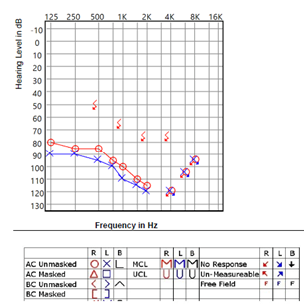Interesting Case: Neurosyphilis presents as sudden bilateral sensorineural hearing loss

A healthy 34-year-old female presented to the UMMC Otolaryngology clinic for evaluation of bilateral hearing loss that started one month prior, and was sudden and progressive in nature. She complained of bilateral tinnitus, but denied dizziness, vertigo, otalgia, otorrhea, gait disturbance, or other motor or sensory dysfunction. She had no family history of hearing loss and denied prior ear-related or autoimmune disorders. On exam, her bilateral external auditory canals were clear and bilateral tympanic membranes were normal without retraction, effusion, or perforation.
An audiogram was obtained (shown above) and was notable for bilateral profound sensorineural hearing loss with absent otoacoustic emissions bilaterally and absent acoustic reflex bilaterally. Magnetic resonance imaging of bilateral internal auditory canals and computed tomography (CT) scan of the temporal bones were obtained and showed normal anatomy. Labs obtained: heat shock protein 70 (HSP 70) antibody was negative; acetylsalicylic (ASA) screen was negative; syphilis rapid plasma reagin (RPR) was reactive; RPR titer was 1:128; fluorescent Treponemal antibody test absorption test (FTA-ABS) was also reactive, establishing a diagnosis of syphilis. A lumbar puncture further established a diagnosis of neurosyphilis.
The patient was given a course of high-dose prednisone and an extended course of penicillin. The patient denied improvement in her hearing after treatment, and post-treatment audiogram remained unchanged. She was deemed a candidate for cochlear implantation. She underwent surgery and is currently doing well.
Sudden onset sensorineural hearing loss in an adult is of great concern and can be attributed to a broad list of etiologies including traumatic, neurologic, autoimmune, infectious, functional, metabolic, vascular, or neoplastic process. It has been reported that at least 13% of cases of sudden sensorineural hearing loss are caused by infections, the most common of which are caused by Lyme disease and syphilis. In the absence of obvious etiology, one must consider the insidious nature of syphilis and its progression to neurosyphilis in light of the emerging prevalence and subsequent sequelae of the disease.


